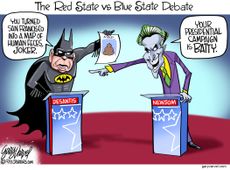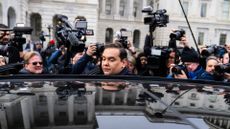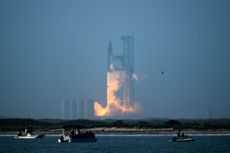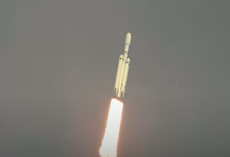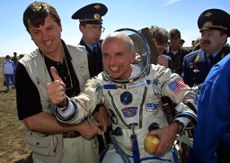When Rishi met Elon: five things we learned from AI summit
AI will put an end to work and we should be wary of Terminator-style robots, says Musk
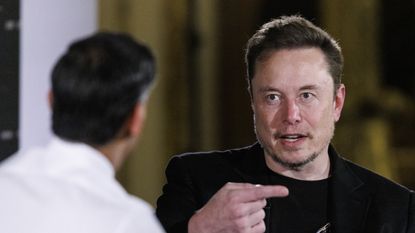
The UK's AI safety summit at Bletchley Park has drawn to a close, with nations signing an international declaration to address risks with the rapidly developing technology.
On the first of the two days, 28 governments, including the UK, US, EU, Australia and China, signed the Bletchley declaration, acknowledging the potentially catastrophic risks posed by artificial intelligence (AI).
On day two, Rishi Sunak unveiled a "landmark" agreement for testing AI models, in which "like-minded governments" can now assess the AI models of eight leading tech companies before their release.
Subscribe to The Week
Escape your echo chamber. Get the facts behind the news, plus analysis from multiple perspectives.

Sign up for The Week's Free Newsletters
From our morning news briefing to a weekly Good News Newsletter, get the best of The Week delivered directly to your inbox.
From our morning news briefing to a weekly Good News Newsletter, get the best of The Week delivered directly to your inbox.
The Week takes a look at five key takeaways from the event.
The Sunak-Musk chat raised eyebrows
The summit was brought to a close with an unprecedented 40-minute one-on-one interview at Lancaster House on The Mall in central London, in which Sunak asked tech billionaire and Tesla CEO Elon Musk about his views on the future of AI.
This set-up raised more than a few eyebrows among British journalists. The Guardian described Sunak's demeanour as that of an "eager chatshow host" who was quick to flatter the world's richest man. "You are known for being such a brilliant innovator and technologist," Sunak told Musk at one point during the interview.
Sky News' deputy political editor Sam Coates described the talk as "one of the maddest events I've ever covered", with "40 minutes of softball questions" and "jovial witticisms" from Sunak.
And The Times' Matt Chorley pondered in a column: "why is the actual prime minister of Great Britain and Northern Ireland sitting here like Gloria Hunniford, hanging on every word of this guy who bought Twitter and drove it towards the ground faster than one of his early rockets?"
AI could eliminate jobs in the future
AI will be "the most disruptive force in history" in terms of jobs, Musk warned Sunak.
"There will come a point where no job is needed – you can have a job if you want to for personal satisfaction," he said. One of the challenges of the future, he added, will be how to find meaning in life in a world where jobs are unnecessary.
Earlier in the conference Sunak had sought to assuage fears over AI's threat to jobs, saying technology should be seen as a "co-pilot" rather than "something that necessarily is going to replace someone’s job".
Responding to Musk's vision of a work-less future, Sunak replied: "I'm someone who believes work gives you meaning."
Fears over 'Terminator-style' robots
One of the more alarming topics of discussion was the scale of the threat AI could pose to humanity.
On the second day of the summit, Sunak said that AI technology could pose a risk "on a scale like pandemics and nuclear war". That was why global leaders had "a responsibility to act to take the steps to protect people".
During his interview with Sunak, Musk said that "we should be quite concerned" about Terminator-style humanoid robots that "can follow you anywhere".
"If a robot can follow you anywhere, what if they get a software update one day, and they're not so friendly any more?" said Musk, stressing the importance of a physical off-switch for such inventions.
A bemused Sunak replied: "You're not selling this."
Sunak's Silicon Valley vision for Britain
During his talk with Musk, Sunak said he wanted to "transpose" the entrepreneurial culture of "places like Silicon Valley", where, according to Sunak, people "are unafraid to give up the security of a regular pay cheque to go and start something and be comfortable with failure".
The comment was branded "out of touch" by Labour front-bencher Jonathan Ashworth, who wrote on the Musk-owned social media platform X: “After 13 years of the Tories, the public are enduring the worst cost-of-living crisis in memory and he is spending his time telling Elon Musk that he wishes they would give up their jobs and be ready to fail. He hasn't got a clue."
… but the summit was a 'diplomatic coup'
Prominent figures, including US Vice President Kamala Harris and European Commission President Ursula von der Leyen, as well as Wu Zhaohui, China's vice minister of science, attended the summit.
"The fact that the prime minister was able to get both China and the U.S. to share a stage and co-sign a statement on frontier AI risks is a major achievement in itself. Both the geopolitics and domestic politics here are so fraught, and it took real creativity and legwork to make this happen," Matt Sheehan, a fellow at the Carnegie Endowment for International Peace, told Politico.
More than 25 countries and the EU signed the Bletchley declaration, which recognised the need to recognise the risks involved in AI development. France will host the next AI safety summit next year, "guaranteeing that Sunak's initiative will live on", said The Guardian.

Continue reading for free
We hope you're enjoying The Week's refreshingly open-minded journalism.
Subscribed to The Week? Register your account with the same email as your subscription.
Sign up to our 10 Things You Need to Know Today newsletter
A free daily digest of the biggest news stories of the day - and the best features from our website
Sorcha Bradley is a writer at The Week and a regular on “The Week Unwrapped” podcast. She worked at The Week magazine for a year and a half before taking up her current role with the digital team, where she mostly covers UK current affairs and politics. Before joining The Week, Sorcha worked at slow-news start-up Tortoise Media. She has also written for Sky News, The Sunday Times, the London Evening Standard and Grazia magazine, among other publications. She has a master’s in newspaper journalism from City, University of London, where she specialised in political journalism.
-
 Today's political cartoons - December 2, 2023
Today's political cartoons - December 2, 2023Cartoons Saturday's cartoons - governors go Gotham, A.I. goes to the office party, and more
By The Week US Published
-
 10 things you need to know today: December 2, 2023
10 things you need to know today: December 2, 2023Daily Briefing Death toll climbs in Gaza as airstrikes intensify, George Santos expelled from the House of Representatives, and more
By Justin Klawans, The Week US Published
-
 5 hilarious cartoons about the George Santos expulsion vote
5 hilarious cartoons about the George Santos expulsion voteCartoons Artists take on Santa versus Santos, his X account, and more
By The Week US Published
-
 Upcoming celestial events to watch in 2023 and beyond
Upcoming celestial events to watch in 2023 and beyondThe Explainer Meteor showers, eclipses and more are coming to the skies
By Devika Rao, The Week US Published
-
 How Iceland deals with volcanic activity
How Iceland deals with volcanic activityThe Explainer Scientists are closely monitoring seismic activity as threat of eruption looms
By Julia O'Driscoll, The Week UK Published
-
 Could AI find alien life before us?
Could AI find alien life before us?Today's Big Question New machine-learning system could tell the origin of samples found on Earth and elsewhere
By Rebekah Evans, The Week UK Published
-
 Geoffrey Hinton: the ‘Godfather of AI’ who quit Google to warn about technology
Geoffrey Hinton: the ‘Godfather of AI’ who quit Google to warn about technologyWhy Everyone’s Talking About Artificial intelligence pioneer says a part of him now regrets his life’s work
By Arion McNicoll Published
-
 Why SpaceX is genuinely cheering the Starship test flight's explosive 'rapid unscheduled disassembly'
Why SpaceX is genuinely cheering the Starship test flight's explosive 'rapid unscheduled disassembly'Speed Read
By Peter Weber Published
-
 dearMoon billionaire selects DJ, YouTuber, and others for 1st private SpaceX lunar mission
dearMoon billionaire selects DJ, YouTuber, and others for 1st private SpaceX lunar missionSpeed Read
By Rafi Schwartz Published
-
 SpaceX launches first Falcon Heavy rocket in 3 years
SpaceX launches first Falcon Heavy rocket in 3 yearsSpeed Read
By Justin Klawans Published
-
 World's 1st space tourist planning to fly around moon
World's 1st space tourist planning to fly around moonSpeed Read
By Justin Klawans Published
